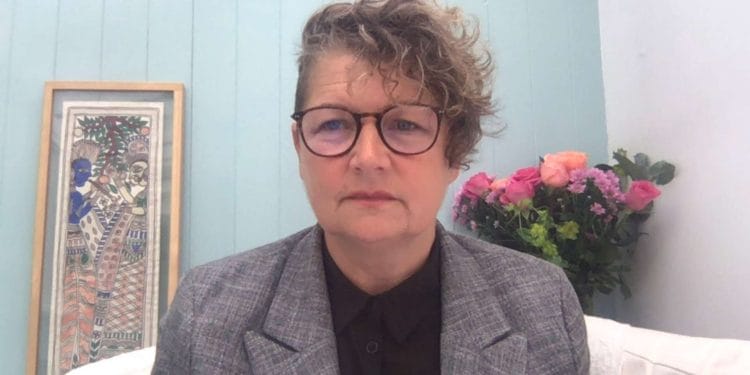Playwright, Kaite O’Reilly brings Missing Julie, freely adapted from Strindberg’s play about class and social Darwinism, to Theatr Clwyd, giving the controversial classic a twentieth century twist.
Kaite O’Reilly is a playwright, radio dramatist, writer, and dramaturg who works in disability arts and culture and mainstream culture.
Missing Julie is at Theatr Clwyd until 9th October 2021. More information can be found here.
Your play Missing Julie is at Theatre Clwyd – what can you tell us about the play?
I hope it has many resonances for now. Set between the world wars at a time of change when society sought to “build back better” after the loss and devastation of conflict and the Spanish flu epidemic.
It explores desire, attraction and the structures that keep people separate and the radical drive which might dismantle these barriers and bring change. It is, I hope, unexpected, surprising and very sexy in Chelsea Walker’s exciting production.
What inspired you to adapt Strindberg’s play in this way?
Class and race have been prisms through which the original have been previously explored – I wanted to explore what might be the final taboo – disability and desire. It also allows us to reconsider privilege, notions of meritocracy and social justice. This build so much of my earlier work And offers a fascinating dynamic.
How important to you was it to retain the central themes of the play?
The forces that separate us and the structures that keep us apart are endlessly fascinating. This is how I’ve interpreted Strindberg’s themes, while challenging the often problematic biases and morality he espouses.
What was the biggest challenge for you as a writer to translate this story to 20th century Wales?
The biggest challenge was finding the right era and approach. Once I settled on 1919 and the time between the two world wars, everything fell into place. It was a fascinating time – of radical change, global loss and when society structures loosened, when everything seemed uprooted and possible following the war, women’s suffrage and the 2 million surplus women-those who should have married the millions lost at the Somme and other battlefields. It was also a time when disability was more common on our streets. Moments of transition and possibility are always rich to explore dramatically.
How does it feel to have the play premiering at Theatr Clwyd?
I’ve always loved Theatr Clwyd not least for the way that it opens itself up to the community. It’s a building that is used in multiple ways by a wide selection of people And it feels so real privilege and honour to be sharing the world premiere of this new version of a classic here.
What would you say to anyone thinking of coming?
Put away your expectations! This isn’t Downton Abbey or a period drama in the traditional sense. It feels strikingly new and contemporary in Chelsea Walker’s production – it is striking, full of pace and tension and has moments that are visually stunning. I’m saying this just before I go into the first preview and I can’t wait!

















